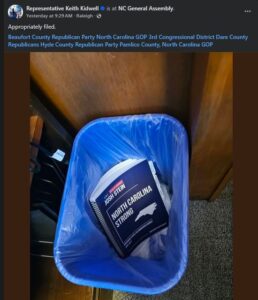
Can we agree that just about everyone wants to live in a community where they feel safe, that they belong, and where they can thrive? This sense of community is part of living in a lot of places in Maine. It is made better or worse depending on where we build our neighborhoods and infrastructure like roads and sidewalks, water and sewer lines, parks and libraries. The Maine Turnpike Authority’s proposed highway expansion through Gorham does just the opposite of this, cutting across farmland to create “nowhere” space that diminishes the economic and community values of surrounding areas.
Smart growth is sustainable growth, and infrastructure projects of this scale just don’t make sense. Nancy Smith is CEO of GrowSmart Maine. If you live in the suburbs and rural places west of Gorham, you have an opportunity to demand that we invest in the infrastructure that keeps residents safe and with a sense of belonging to a community, while also creating opportunities to thrive.

The Legislature’s Transportation Committee will be hearing a bill to repeal state authorization for the construction of the highway expansion in Gorham on April 3. LD 1020 would also require the Maine Turnpike Authority (MTA) to return property it has acquired in pursuit of this ill-conceived project to the prior owners at the same cost MTA acquired the property, or if that is unsuccessful, to transfer ownership at no cost to the municipality where it is located. The municipality can then choose to keep the property or donate it to a local land trust at no cost.
While we celebrate the news that the MTA recently announced that it would no longer pursue the Connector project and instead work with the state’s Department of Transportation on alternative solutions to commuter congestion, our work is not done. Passage of LD 1020 will ensure this highway expansion does not come back to life, as can happen with “zombie projects” that are backburnered but then zapped back to the headlines year later — “refreshed” or “renewed,” but with the same faulty philosophy at their core. Moving more cars more quickly is not an effective approach to soothing traffic congestion long term, while building infrastructure for that sole purpose leads to irreparable damage to communities in the long run.
If MTA commissioners and staff are sincere in their claims that they are “committed to exploring innovative solutions that not only improve mobility but also support affordable housing, workforce development, sustainability and efficient transit options,” they’ll embrace this bill. In Westbrook and Scarborough, the public process worked. It was responsive to community feedback that made clear residents wanted longer-term and more cost-effective solutions than a four-mile highway at the cost of over $300 million.
According to a recently published report from the Public Transit Advisory Council, Maine’s public transportation system meets only 11% of need in the state. In addition to targeted infrastructure improvements west of Portland (roundabouts to replace traffic lights, modest road widening in places it makes sense, improved buffers to allow for safe active transportation), let’s find a way to bolster public transportation. The process for providing your thoughts on a bill is pretty straightforward, and there’s a way to share your ideas and concerns ahead of time, online, ahead of the public hearing.
Visit our Policy Action webpage to find tools to help you write and submit testimony and keep up to date with this bill and others. We can put this zombie project finally and completely to rest with the passage of LD 1020, protecting Smiling Hill Farm from this threat, and ensuring transportation and economic investments are offering long-term and cost-effective solutions. Productive farmland, busy village centers and downtowns and local places to work and recreate are the core of communities where people feel safe, that they belong, and that they can thrive.
Gorham and surrounding towns deserve nothing less than that and passage of LD 1020 will go a long way toward that vision. We believe it’s important to offer commenting on certain stories as a benefit to our readers. At its best, our comments sections can be a productive platform for readers to engage with our journalism, offer thoughts on coverage and issues, and drive conversation in a respectful, solutions-based way.
It’s a form of open discourse that can be useful to our community, public officials, journalists and others. Read more..
. We do not enable comments on everything — exceptions include most crime stories, and coverage involving personal tragedy or sensitive issues that invite personal attacks instead of thoughtful discussion. For those stories that we do enable discussion, our system may hold up comments pending the approval of a moderator for several reasons, including possible violation of our guidelines.
As the Maine Trust’s digital team reviews these comments, we ask for patience. Comments are managed by our staff during regular business hours Monday through Friday and limited hours on Saturday and Sunday. Comments held for moderation outside of those hours may take longer to approve.
By joining the conversation, you are agreeing to our commenting policy and terms of use . More information is found on our FAQs . You can modify your screen name here .
Show less Please sign into your Press Herald account to participate in conversations below. If you do not have an account, you can register or subscribe . Questions? Please see our FAQs .
Your commenting screen name has been updated. Send questions/comments to the editors..














